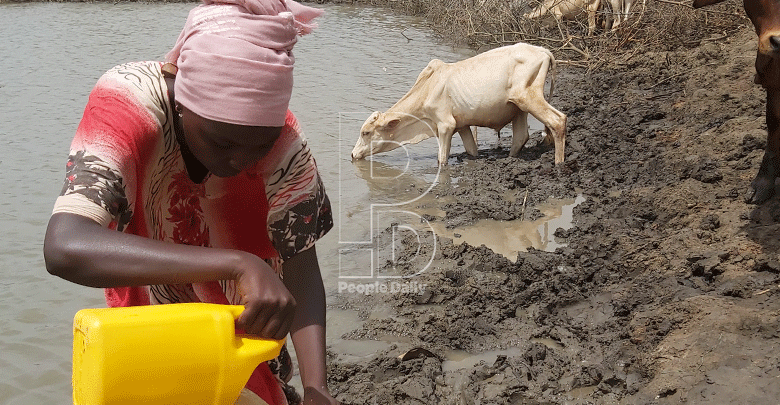Hundreds face famine as drought hits NE

Kirera Mwiti and Roy Lumbe
The government has identified Marsabit, Turkana and Mandera as the counties most affected by the current drought that has hit parts of the country.
The counties have been placed under the ‘alarm stage’ as the State, through the Hunger Safety Network, moved in to cushion the affected families.
Devolution Cabinet Secretary Eugene Wamalwa attributed the famine to failed rains in the past year.
Wamalwa said projections by the National Drought Management Authority (NDMA) painted a grim picture with fears that more counties would be affected.
“We have placed Marsabit, Turkana and Mandera under the alarm stage because of the ravaging drought and we are working with the respective governors to support the affected families,” he said.
Expanded list
Speaking in Naivasha during a meeting with governors from the affected counties and senior NDMA officials, he said the government is keen to stop human and animal deaths from drought.
To address the problem, he said the government has increased the number of counties benefitting from the Hunger Safety Net Programme from four to eight.
Turkana, Marsabit, Wajir and Mandera, he said have benefitted from the first phase adding that Garissa, Samburu, Isiolo and Tana River would benefit from the expanded list.
The CS said the cash transfer programme in the affected counties targeted more than 100,000 vulnerable families.
“In conjunction with the affected counties, we have embarked on the process of supplying water using trucks and we shall roll out the Inua Jamii programme by September,” he said.
The CS added that they would harmonize the cash transfer programme and digitise it to avoid double allocation of funds to the same persons.
Marsabit Governor Ali Mohamud said the drought hasaffected nearly all the counties in Northern Kenya.
While calling for donor support, he noted that the cash transfer programme was the way to go, adding that more water was needed in the counties enable residents engange in irrigation.
Meanwhile, Nakuru county has raised the alarm over looming famine because of inadequate rainfall.
County Chief Officer in charge of Agriculture Kibet Maina said low and unreliable rainfall in the county has led to below-average crop harvest.
“We have been witnessing erratic rainfall and has been below average which has greatly affected production of our major food crops,” he said during a farmers stakeholder’s meeting organised by Agriculture Sector Network (ASNET).
“We are among the major food producers in the country and the current situation will be felt in the few months to come.
We expected to produce 1.9 million bags of maize but we have revised that downwards to a million bags,” said Maina.
Kenya National Farmers Federation (Kenaff) Nakuru chairman Luke Esei said low rainfall has led to resurgence of pests and diseases.
The Results for Africa Institute founder Joyce Nyamweya decried low budgetary allocation to agriculture sector despite the fact that it is the backbone of the economy.











